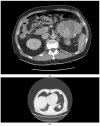The Role of Cytoreductive Nephrectomy in Renal Cell Carcinoma with Sarcomatoid Histology: A Case Series and Review of the Literature
- PMID: 36005171
- PMCID: PMC9406807
- DOI: 10.3390/curroncol29080433
The Role of Cytoreductive Nephrectomy in Renal Cell Carcinoma with Sarcomatoid Histology: A Case Series and Review of the Literature
Abstract
Background: Renal cell carcinoma with sarcomatoid dedifferentiation represents a rare histological entity characterized by aggressive behavior, limited efficacy of tyrosine kinase inhibitors or mTOR inhibitors, and poor outcome. The immune checkpoint inhibitor therapy regimen combining ipilimumab with nivolumab represents a new standard of care for this patient population due to a hitherto unprecedented response rate and overall survival. On the other hand, the role of cytoreductive nephrectomy in metastatic renal cell carcinoma, in particular, with sarcomatoid histology, remains controversial.
Patient and methods: In the present case series, we report six patients with locally advanced or synchronous metastatic sarcomatoid renal cell carcinoma and intermediate or poor International Metastatic RCC Database Consortium (IMDC) risk score, five of whom were successfully subjected to cytoreductive nephrectomy.
Results: All six patients received the combination regimen of ipilimumab with nivolumab. Five of these patients underwent upfront cytoreductive nephrectomy followed by systemic treatment without any significant delay, with a durable treatment outcome. Notably, two patients with poor prognostic features achieved a long-term major partial response to therapy. We also performed a review of the literature on optimal treatment strategies for patients with sarcomatoid renal cell carcinoma.
Conclusion: Herein, we highlight the feasibility of performing cytoreductive nephrectomy in patients with intermediate/poor prognosis metastatic renal cell carcinoma with sarcomatoid dedifferentiation followed by immunotherapy with ipilimumab and nivolumab. To enhance the chances of immunotherapy success, cytoreductive nephrectomy should also be considered for patients presenting with a disease with adverse prognostic parameters.
Keywords: checkpoint inhibitors; cytoreductive nephrectomy; immunotherapy; renal cell carcinoma; sarcomatoid.
Conflict of interest statement
The authors report no conflict of interest in this work.
Figures



Similar articles
-
Therapeutic role of deferred cytoreductive nephrectomy in patients with metastatic renal cell carcinoma treated with nivolumab plus ipilimumab.Jpn J Clin Oncol. 2022 Oct 6;52(10):1208-1214. doi: 10.1093/jjco/hyac099. Jpn J Clin Oncol. 2022. PMID: 35780441
-
Complete response to combination therapy using nivolumab and ipilimumab for metastatic, sarcomatoid collecting duct carcinoma presenting with high expression of programmed death-ligand 1: a case report.J Med Case Rep. 2022 May 18;16(1):193. doi: 10.1186/s13256-022-03426-3. J Med Case Rep. 2022. PMID: 35581611 Free PMC article.
-
The role of cytoreductive nephrectomy in metastatic renal cell carcinoma in immune-oncology era (SEVURO-CN): study protocol for a multi-center, prospective, randomized trial.Trials. 2024 Jul 3;25(1):447. doi: 10.1186/s13063-024-08234-2. Trials. 2024. PMID: 38961439 Free PMC article.
-
Systematic Review of the Role of Cytoreductive Nephrectomy in the Targeted Therapy Era and Beyond: An Individualized Approach to Metastatic Renal Cell Carcinoma.Eur Urol. 2019 Jan;75(1):111-128. doi: 10.1016/j.eururo.2018.09.016. Epub 2018 Oct 25. Eur Urol. 2019. PMID: 30467042
-
Should CARMENA Really Change our Attitude Towards Cytoreductive Nephrectomy in Metastatic Renal Cell Carcinoma? A Systematic Review and Meta-Analysis Evaluating Cytoreductive Nephrectomy in the Era of Targeted Therapy.Target Oncol. 2018 Dec;13(6):705-714. doi: 10.1007/s11523-018-0601-2. Target Oncol. 2018. PMID: 30324488
Cited by
-
Cytoreductive Nephrectomy and Metastatic Renal Cell Carcinoma: State of the Art and Future Perspectives.Medicina (Kaunas). 2023 Apr 15;59(4):767. doi: 10.3390/medicina59040767. Medicina (Kaunas). 2023. PMID: 37109725 Free PMC article. Review.
-
The Evolving Landscape of Cytoreductive Nephrectomy in Metastatic Renal Cell Carcinoma.Cancers (Basel). 2023 Jul 29;15(15):3855. doi: 10.3390/cancers15153855. Cancers (Basel). 2023. PMID: 37568671 Free PMC article. Review.
-
The Metastasis Pattern of Renal Cell Carcinoma Is Influenced by Histologic Subtype, Grade, and Sarcomatoid Differentiation.Medicina (Kaunas). 2023 Oct 17;59(10):1845. doi: 10.3390/medicina59101845. Medicina (Kaunas). 2023. PMID: 37893563 Free PMC article.
-
Recent Advances in the Management of Clear Cell Renal Cell Carcinoma: Novel Biomarkers and Targeted Therapies.Cancers (Basel). 2023 Jun 16;15(12):3207. doi: 10.3390/cancers15123207. Cancers (Basel). 2023. PMID: 37370817 Free PMC article. Review.
-
PNI as a Potential Add-On Biomarker to Improve the IMDC Intermediate Prognostic Score.J Clin Med. 2023 Oct 9;12(19):6420. doi: 10.3390/jcm12196420. J Clin Med. 2023. PMID: 37835062 Free PMC article.
References
-
- Kim T., Zargar-Shoshtari K., Dhillon J., Lin H.Y., Yue B., Fishman M., Sverrisson E.F., Spiess P.E., Gupta S., Poch M.A., et al. Using percentage of sarcomatoid differentiation as a prognostic factor in renal cell carcinoma. Clin. Genitourin. Cancer. 2015;13:225–230. doi: 10.1016/j.clgc.2014.12.001. - DOI - PubMed
-
- Kyriakopoulos C.E., Chittoria N., Choueiri T.K., Kroeger N., Lee J.L., Srinivas S., Knox J.J., Bjarnason G.A., Ernst S.D., Wood L.A., et al. Outcome of patients with metastatic sarcomatoid renal cell carcinoma: Results from the International Metastatic Renal Cell Carcinoma Database Consortium. Clin. Genitourin. Cancer. 2015;13:e79–e85. doi: 10.1016/j.clgc.2014.08.011. - DOI - PubMed
Publication types
MeSH terms
Substances
LinkOut - more resources
Full Text Sources
Medical
Miscellaneous

